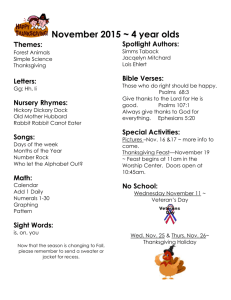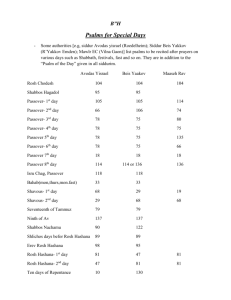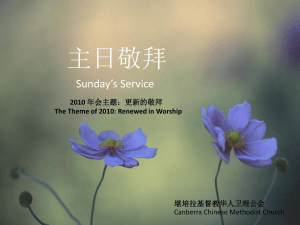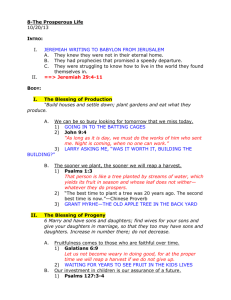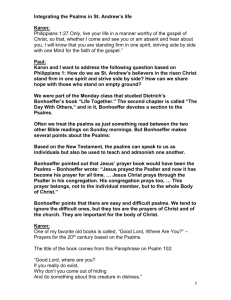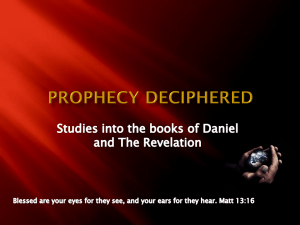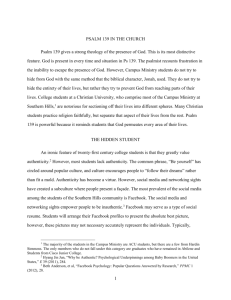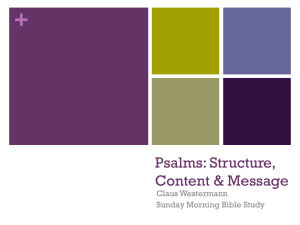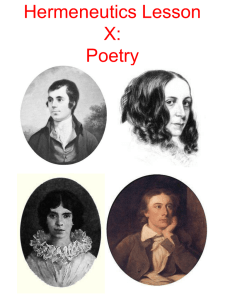Textbooks - Trinity Western University
advertisement
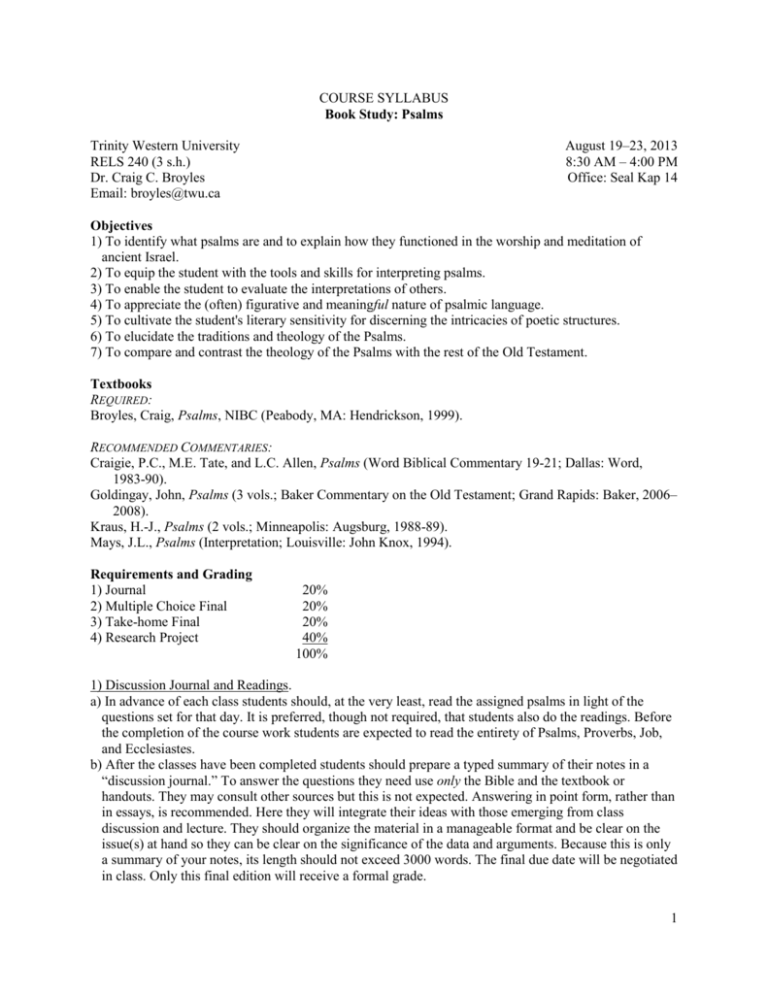
COURSE SYLLABUS Book Study: Psalms Trinity Western University RELS 240 (3 s.h.) Dr. Craig C. Broyles Email: broyles@twu.ca August 19–23, 2013 8:30 AM – 4:00 PM Office: Seal Kap 14 Objectives 1) To identify what psalms are and to explain how they functioned in the worship and meditation of ancient Israel. 2) To equip the student with the tools and skills for interpreting psalms. 3) To enable the student to evaluate the interpretations of others. 4) To appreciate the (often) figurative and meaningful nature of psalmic language. 5) To cultivate the student's literary sensitivity for discerning the intricacies of poetic structures. 6) To elucidate the traditions and theology of the Psalms. 7) To compare and contrast the theology of the Psalms with the rest of the Old Testament. Textbooks REQUIRED: Broyles, Craig, Psalms, NIBC (Peabody, MA: Hendrickson, 1999). RECOMMENDED COMMENTARIES: Craigie, P.C., M.E. Tate, and L.C. Allen, Psalms (Word Biblical Commentary 19-21; Dallas: Word, 1983-90). Goldingay, John, Psalms (3 vols.; Baker Commentary on the Old Testament; Grand Rapids: Baker, 2006– 2008). Kraus, H.-J., Psalms (2 vols.; Minneapolis: Augsburg, 1988-89). Mays, J.L., Psalms (Interpretation; Louisville: John Knox, 1994). Requirements and Grading 1) Journal 2) Multiple Choice Final 3) Take-home Final 4) Research Project 20% 20% 20% 40% 100% 1) Discussion Journal and Readings. a) In advance of each class students should, at the very least, read the assigned psalms in light of the questions set for that day. It is preferred, though not required, that students also do the readings. Before the completion of the course work students are expected to read the entirety of Psalms, Proverbs, Job, and Ecclesiastes. b) After the classes have been completed students should prepare a typed summary of their notes in a “discussion journal.” To answer the questions they need use only the Bible and the textbook or handouts. They may consult other sources but this is not expected. Answering in point form, rather than in essays, is recommended. Here they will integrate their ideas with those emerging from class discussion and lecture. They should organize the material in a manageable format and be clear on the issue(s) at hand so they can be clear on the significance of the data and arguments. Because this is only a summary of your notes, its length should not exceed 3000 words. The final due date will be negotiated in class. Only this final edition will receive a formal grade. 1 2) Multiple Choice Final. This will be given at the end of the last class. 3) Take-home Final. This will consist of brief essays. The due date will be negotiated in class. 4) Research Paper. The paper should be 2400 words (maximum) and involve the student in exegesis and also address a particular issue. Further instructions will be given at our first meeting. The due date will be negotiated in class. Course Outline MONDAY Genre & Setting of a “Psalm”: What is a Psalm? OT texts: Ps 24 Textbook reading: Broyles, pp. 1-9, 26-31, and the commentary on Ps 24; “Remixing the Psalms,” Bible Study Magazine 1.6 (Sept.-Oct. 2009), 28-30; Broyles, “Read the Bible as Inspired Scripture,” Bible Study Magazine 3.4 (May-June 2011), 33-36 Discussion questions: 1. What is Ps 24 about? Who are the different speakers? What are the main sections of this psalm, and how are they related? 2. In view of the required reading, how would you define what a “psalm” is? In particular, what was its original function in the pre-exilic period? 3. How is the historical David associated with the biblical psalms (see esp. Broyles, pp. 26-31)? 4. How does the “sacred reading” of Scripture attempt to revive how divine revelation was heard during the pre-exilic (First Temple) period of ancient Israel? Liturgies of Temple Entry OT texts: Pss 15; 24; 5; 26; 28; 36; 52; 73; 139 Textbook reading: Broyles, pp. 9-13, 31-32; and the commentary on these psalms Discussion questions: 5. Which theory makes better sense of Pss 5; 26; 28; 36; 52 (also consider briefly Pss 73; 139): to read them as individual prayers/laments, esp. as psalms of the falsely accused, or as liturgies of temple entry? 6. What does Yahweh expect of his people, especially relative to social ethics and religious ritual? TUESDAY Pilgrim Prayers OT texts: Pss 23; 61 Textbook reading: Broyles on Pss 23; 61 Discussion question: 7. What promises for pilgrims are confessed and implied in Pss 23 and 61? Hymns OT texts: Pss 33; 65; 66; 68; 104 Textbook reading: Broyles, pp. 13-15, and the commentary on these psalms Optional reading: C.C. Broyles, “The Psalms and Cult Symbolism: The Case of the Cherubim-Ark,” Interpreting the Psalms (ed. Philip S. Johnston and David G. Firth; Leicester, UK/Downers Grove, IL: Inter-Varsity, 2005) 139-156 2 Discussion questions: 8. What is the “thread” that ties Ps 68 together as a unit? 9. Is there enough evidence to suggest that Pss 65 and 66 were designed for particular sacred festivals? What does Psalm 66 imply about the “I” and “we” forms of expression and their place in worship? 10. How does Ps 33 bring particular theological traditions to bear on the particular need reflected in the psalm? 11. What are the diverse streams of tradition that converge in Ps 104? (Read the handout, the Egyptian “Hymn To Aten.”) What is its main point? WEDNESDAY Songs of Zion and the Zion Tradition OT texts: Pss 46; 48; 87 Textbook reading: Broyles, pp. 15, 22-25; and the commentary on these psalms Discussion question: 12. What is the essence of the “Zion tradition” according to these psalms? Psalms of Yahweh’s Kingship and the Tradition of Cosmic Kingship OT texts: Pss 29; 47; 93; 96-99 Textbook reading: Broyles, pp. 15-16, 25-26; and the commentary on these psalms; “Psalms and the Ancient World,” Bible Study Magazine 1.6 (Sept.-Oct. 2009), 34-37 Discussion question: 13. How do these psalms creatively use traditions, also understood in the ANE (esp. Canaan and Mesopotamia), to communicate who Yahweh is? What are the attributes of his kingship? Spirituality and the Praise Psalms Textbook reading: Broyles, pp. 34-35 Discussion question: 14. What practical lessons do the praise psalms provide for Christian spirituality? THURSDAY Prayers and Thanksgivings: Individual and Corporate OT texts: Pss 13; 22; 51 (individual prayers) Pss 30; 116 (individual thanksgivings) Pss 9-10; 44; 67; 89 (corporate prayers) Textbook reading: Broyles, pp. 16-20, 22-23, and the commentary on these psalms Optional reading: C.C. Broyles, “Lament, Psalms of,” Dictionary of the Old Testament: Wisdom, Poetry & Writings (ed. Tremper Longman III and Peter Enns; Downers Grove: InterVarsity Press, 2008) 38499. Discussion questions: 15. Individual Prayers. How do Pss 13; 22; 51 form a persuasive appeal to move Yahweh to act? 16. Individual Thanksgivings. How do Pss 30; 116 form the flip side of individual prayers? 17. Corporate Prayers. How do Pss 9-10; 44; 89 employ the traditions of praise in its corporate prayer? What traditions does Ps 67 combine? Spirituality and the Prayer Psalms Textbook reading: Broyles, pp. 32-34, 35-37 3 Discussion question: 18. What practical lessons do the prayer psalms provide for Christian spirituality? FRIDAY Royal Psalms OT texts: Pss 2; 72; 89; 132 Textbook reading: Broyles, pp. 20-21, and the commentary on these psalms Discussion question: 19. While the OT “historical books” describe for us a realistic portrayal of Davidic kingship as its actually happened, the royal psalms present us with the prescribed ideal of how Davidic kings should have ruled. Briefly what attributes should define the Davidic king? Wisdom and Torah Psalms OT texts: Pss 1; 19; 37 Textbook reading: Broyles, pp. 21-22 , and the commentary on these psalms Discussion question: 20. How are these psalms different from the other genres of psalms studied to this point? What do they share with the Wisdom tradition outside the Psalter? How do they reflect emergent Judaism, as distinct from the Israelite religion of the pre-exilic era? Memories in the Psalms: Yahweh’s Developing Character in the Psalms 4 Policies Academic Integrity and Avoiding Plagiarism at TWU. As Christian scholars pursuing higher education, academic integrity is a core value of the entire TWU community. Students are invited into this scholarly culture and required to abide by the principles of sound academic scholarship at TWU. This includes, but is not limited to, avoiding all forms of plagiarism and cheating in scholarly work. TWU has a strict policy on plagiarism (see academic calendar). Learning what constitutes plagiarism and avoiding it is the student's responsibility. An excellent resource describing plagiarism and how to avoid it has been prepared by TWU Librarian William Badke and is freely available for download (PPT file) or used as flash (self-running) tutorials of varying lengths from: http://www.acts.twu.ca/lbr/plagiarism.ppt http://www.acts.twu.ca/lbr/Plagiarism.swf (14 minute flash tutorial) http://www.acts.twu.ca/lbr/Plagiarism_Short.swf (8 minute flash tutorial) Campus Closure and Class Cancellation Policy. In the event of deteriorating weather conditions or other emergency situations, every effort will be made to communicate information regarding the cancellation of classes to the following radio stations CKNW (980 AM), CKWX (1130 AM), STAR FM (107.1 FM), PRAISE (106.5 FM) and KARI (550 AM). As well, an announcement will be placed on the University’s campus closure notification message box (604.513.2147) and on the front page of the University’s website (http://www.twu.ca – also see http://www.twu.ca/conditions for more details). An initial announcement regarding the status of the campus and cancellation of classes is made at 6:00 AM and covers all classes beginning before 1:00PM. A second announcement is made at 11:00AM that covers all classes which begin between 1:00PM and 5:00PM. A third announcement is made at 3:00PM and covers those classes which begin after 5:00PM. If this specific class must be cancelled for any other reason, the instructor will communicate this in advance. In the case of an unexpected cancellation, a sign will be posted on the classroom door. University Standard Grading System. Letter Grade A+ A AB+ B BC+ C CD+ D DF Percentage 90-100 85-89 80-84 77-79 73-76 70-72 67-69 63-66 60-62 57-59 53-56 50-52 Below 50 Great Point 4.3 4.0 3.7 3.3 3.0 2.7 2.3 2.0 1.7 1.3 1.0 .7 0 Attendance Policy. “Students are expected to attend all classes on a regular basis...Instructors have the right to bar students from writing the final examination in a course when students have missed 25 per cent or more of the sessions in the course, provided this potential consequence is indicated in the course syllabus." Academic Calendar Final Examinations. "A student who is absent from a final examination without an acceptable excuse will be assigned a zero for that examination…the student must notify the faculty member prior to the examination and the Office of the Registrar within 48 hours of the missed examination, giving written documentation [medical certificate] explaining the absence [and nature of the illness].” Academic Calendar. Students With Disabilities. "Students with a disability who need assistance are encouraged to contact the Equity of Access Office upon admission to TWU…All disabilities must be recently documented by an appropriately certified professional…Within the first two weeks of the semester, students must meet with their professors to agree on accommodations appropriate to each class. Students should follow the steps detailed by the Equity of Access Office outlined in the Student Life section of Calendar." Academic Calendar 5
